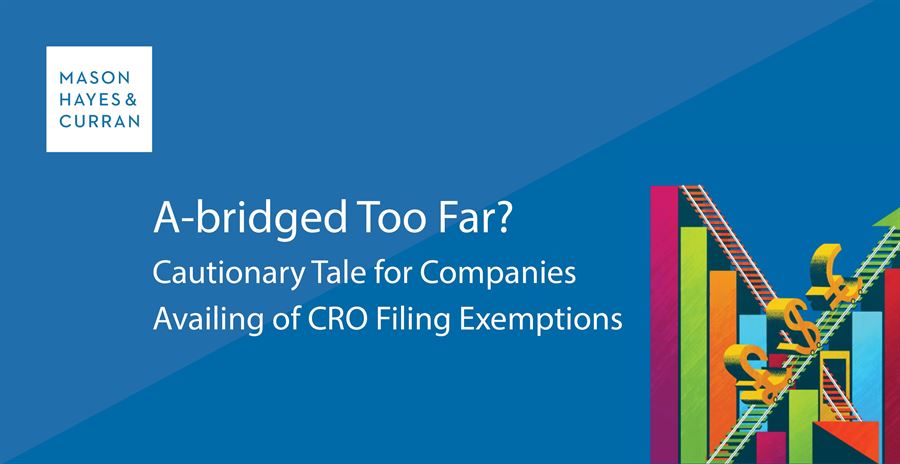A-bridged Too Far? Cautionary Tale on CRO Filing Exemptions

The Court of Appeal delivered its judgement in Wee Care Limited v Companies Registration Office [2020] IECA 266 on 2 October 2020. This is the first written judgement to consider the inherent jurisdiction of the High Court to order the removal of documents from the register.
Background
Section 366 of the Companies Act 2014 (the Act) permits directors of a company to prepare revised financial statements or a revised directors’ report where it appears that either the statements or the report did not comply with the requirements of the Act. This can occur when information is omitted, incorrect, or incomplete.
If revised financial statements are prepared, they must:
refer to the fact that a previous set of financial statements was revised and
provide the particulars of, the reasons for, and the effect of the revision.
Section 352 of the Act permits qualifying companies to file abridged accounts for a financial year. A company must satisfy two of three conditions to qualify:
(a) have a turnover not exceeding €12 million
(b) have a balance sheet that shows aggregate assets not exceeding €6 million
(c) have an average number of employees not exceeding 50.
Facts
Wee Care Limited qualified as a small company for the financial year ending 30 April 2018 and was entitled to file abridged financial statements for that financial year. The full financial statements were filed at the CRO in error on 22 October 2018. Wee Care Limited sought a High Court order to have the full accounts replaced with the abridged accounts.
The High Court determined that it did not have the jurisdiction to grant this order. The Court of Appeal was asked to consider whether, subject to section 366 of the Act or because of an inherent jurisdiction, the High Court could order the Registrar to replace the full financial statements with the abridged financial statements.
Judgment
Justice Haughton considered whether the courts had the power under section 366 to order the removal of documents from the register and he determined that they did not. It is the directors, rather than the courts, who may voluntarily revise financial statements that do not comply with the Act. He also clarified that section 366 is designed to permit the revision of incorrect information rather than the removal of correct information from the register.
Justice Haughton then considered whether the courts had an inherent jurisdiction to rectify the register, referring to Air France Aircraft Leasing Limited v Registrar of Companies and 3V Transaction Services Limited (both unreported). He determined that if there is an inherent jurisdiction ‘it is one to be exercised cautiously and only in compelling circumstances.’ He had regard to the opinion of the directors that the information contained in the full set of accounts was commercially sensitive, but did not find any evidence that the information had been accessed by the company’s competitors and used to their competitive advantage.
Ultimately, the case did not meet the threshold that would allow the High Court to exercise any inherent jurisdiction it may have to rectify the register, and the appeal was dismissed
This case confirms that the responsibility for filing accurate information lies with the company and that the court will only intervene in limited circumstances and in a limited way. It is a lesson to ensure that the correct accounts are uploaded and filed with the Companies Registration Office.
For more information contact a member of our Corporate Governance and Compliance team.
The content of this article is provided for information purposes only and does not constitute legal or other advice.
Share this:




